Dashnor Kaloçi
The first part
Memorie.al/ publishes some archival documents extracted from the Central State Archive in Tirana (Fund of the former Central Committee of PPSh), which contain the acronym “Secret” and “Top Secret” and belong to a period from January from 1982 until September 1983, where there is a voluminous file with minutes of meetings of the Secretariat of the Central Committee and the Political Bureau of the Central Committee of the PPSh, meetings which were chaired by its General Secretary, Enver Hoxha, where they assisted: Ramiz Alia, Adil Çarçani, Manush Myftiu, Hekuran Isai, Rita Marko, Pali Miska, Hajredin Çeliku, Haki Toska, Simon Stefani, Lenka Çuko, Muho Asllani, Vangjel Çerrava, etc., as the main topic is analysis about the “hostile activity” of Mehmet Shehu and his close collaborators, from Fadil Paçrami, Todi Lubonja, Beqir Balluku, Petrit Dume, Hito Çako, Abdyl Këllezi, Koço Theodhosi, Kiço Ngjela, Vasil Kati, Kadri Hazbiu, Fiqret Shehu, Feçor Shehu, Mihalla q Ziçishti, Llambi Peçini, etc. In the file available to Memorie.al, in addition to the analysis of the “hostile activity of the police agent Mehmet Shehu and his associates Beqir Balluku and Kadri Hazbiu”, in the meetings of the Political Bureau and the daily meetings of the Secretariat of the PPS Central Committee, are analyzed also the activity of the Ministry of Internal Affairs and State Security, with its agency and collaborators, inside and outside the country, the reports and relations of the Albanian state with different countries of the world, such as: the USA, the Soviet Union, West Germany, England, Spain, Italy, as well as those with neighbors, such as Greece and Yugoslavia and the demonstrations in Kosovo, how the world press presented Socialist Albania, the talks with West Germany about the War reparations payments, meetings and conversations with party leaders Marxist-Leninists from different countries of the world, such as Ernest Aust, Zhoao Amazonas, Fosko Dinuçi, etc., regarding the “suicide of Mehmet Shehu”, the problems of Polish immigration tic Albanian, in different countries of the world, and the change of the exchange rate of the dollar in the remittances, which they made to their relatives in Albania, up to numerous economic problems, from heavy industry, hydropower plants on the cascade of the river Drin, energy import and export, etc., etc.
The document with the minutes of the daily meeting of the secretaries of the Central Committee of PPSh, held on January 27, 1982, related to the “hostile activity of Mehmet Shehu”!
DAILY MEETING
OF THE SECRETARIES OF THE CENTRAL COMMITTEE OF PPPSH
(REGISTERED JANUARY 27, 1982)
COMRADE RAMIZ ALIA: The differentiations that Mehmet Shehu made among the cadres, that some he caressed, others he ignored, apart from others, weakened the strength of the collective and caused his ego to predominate in government meetings. Therefore, it is important to look at the decisions that have been made, that in addition to these, Comrade Enver, we also have two important decisions of the Party, which speak about the working method in state apparatuses, such as the one of the 7th plenum of the Central Committee, of 1980, where the specific tasks for the government were defined, and that of the Political Bureau, from last year, when we discussed the agencies, for which there are also concrete remarks about the work method. Neither one nor the other of these decisions have been implemented, because Mehmet Shehu was behind these decisions.
COMRADE ENVER HOXHA: Now it is clear to us that Mehmet Shehu was an enemy, who sought and tried to change and sabotage the general straight line of the Party and the construction of socialism. This was his main objective, but he could not do this, because the Party did not let him, its leadership did not let him. Mehmet Shehu was afraid of his “bravery”, he felt that, if he deviated openly, neither the Party nor the leadership would let him. He was ambitious and his ambition was unbridled.
Only the straight line of the Party restrained him to some extent. However, he made every effort to dedicate everything to his person. His egocentrism was seen especially in power, on the government side, where he had built such a work system, that even an injury that happened in Velabisht, the Ministry of the Interior, had to report to him. Every day this practice was followed, so-and-so was not injured, this hut was not burned, and then the main ones were neglected.
I told him several times: More, why do you need these things?! But he continued on his own. He could not do this work by himself, therefore, he changed the meaning and direction of the work of the Presidency of the Council of Ministers, to put this body at his personal service, and as you know, he created such a system, with the apparatus of the Council of Ministers, so that things did not go the way of the Party. His goal was to: turn the presidency of the Council of Ministers into an egocentric body, even to create a certain fascist authoritarianism there, disguised in socialist forms.
His arrogance and prepotency, the insults he used against people and the insults he made, only a fascist can do, no one else, let alone a communist. He had also introduced such a work method and fear into the central dicastery, to such a degree that he had functioned with responsibility that they said that, when he was in front of Mehmet Shehu, his legs trembled. This forced us to put an end to this situation.
It is a fact and must be accepted that we did not know Mehmet Shehu as he really was, a disguised enemy, but we have had many remarks about his working method. In a word, in the method and style of his work, he sabotaged, restrained the development of affairs, suppressed the initiative, courage, courage, and creative thinking of our people, of course, as much as he could, that we cannot say, that acted openly. When he saw that he could be discovered, he guarded himself, and gathered his feet, In all his hostile activity, he was also helped by Fiqret.
What happens to us now? It turns out that Mehmet Shehu’s great speeches, such as those of the great military game that took place in Durrës, were recorded and through Fiqret, supposedly because the Scientific Council of the Party School wanted to hear them, made them available to you students and teachers of this school and for eight hours in a row, they listened to these speeches.
Why were these actions done? These were done to raise the authority of Mehmet, for today and for tomorrow. The work methods and the whole spirit of his work aimed to create in our people the view and at the same time the fear that this is a good man that he has everything in hand, that if he says it, it will be done at once, if he said it, even the sun can sit on the ground.
Mehmet Shehu did not hit the Party line frontally, but with the work method he had worked out and this was an improvised method. If we delve into the matter well, his work was planned long ago; it was the work of an old enemy. Of course, he was constantly guarded, so that he wouldn’t be discovered, but he was a man with great ambition for power.
He was against the Party’s line; he was against the Party itself and our government, which he saw that he could not overthrow, because several times in a row he saw for himself what his comrades suffered. But he tried to reach his goal by other means, until he died.
Now we are looking and reviewing all those forms of work that Mehmet Shehu used, the various ordinances that he issued, which seemed like they were good, but in fact, they should not have been like that, because no matter how much they intended to to achieve his goal, to prepare the ground to destroy the Party and our people’s power, so that the situation created in our country would be overturned, either naturally, or with a coup, then some of those he had paid to kill, others, to take them to court.
Mehmet Shehu had prepared the ground and tried to create the opinion that he was “very principled”, “a great Marxist-Leninist”, “an outstanding strategist” in the military field. Yes, he was a strategist and tactician, but of coups and conspiracies. He has been at the head of all the conspiracies that we have discovered, but he followed such tactics that when he saw that a conspiracy was failing, he himself retreated, folded his legs.
When he saw that a plot was being prepared, he pretended to be asleep, which served him well. And when he saw that the Party was discovering this, he immediately came out on the Party’s side and, as much as he could, tried to leave the impression, as if he had discovered it himself.
We must understand that, the right path followed by the Party, when it hit the enemies that were discovered, he tried to use it to help him, to further strengthen his positions. So he used the ruse, pretending to be in agreement with the measures and the Party line, to give the punch to the enemies, while when the Party discovered them, even though he himself was at the head, he retreated and not only tried to take the flag, but also to add doses of fascist methods to his activity. He did not do this spontaneously, but in a well-studied and careful way.
COMRADE RAMIZ ALIA: Even when the time came to strike, his opponents, as a fascist, as a terrorist that he was, he would do this in the name of the Party’s methods.
COMRADE ENVER HOXHA: Yes, yes, definitely.
The document with the minutes of the daily meeting of the secretaries of the Central Committee of the PPSh, held on March 1, 1982, regarding the “hostile activity of Mehmet Shehu and Abdyl Këllez”!
DAILY MEETING
OF THE SECRETARIES OF THE CENTRAL COMMITTEE OF THE PARTY
ON MARCH 1, 1982
Registration
In this meeting, we talked about the enemies Mehmet Shehu and Avdyl Këllezi, about the decentralization of the economy in our country and the introduction of our own system – the Yugoslav administration.
COMRADE ENVER HOXHA: Mehmet Shehu and Avdyl Këllezi, tried to find and would find the forms, so to speak, of a gradual transition, in the direction of the Yugoslav self-administration. What were those forms?
The first was the issue of decentralization of the economy. This was their main object. Mehmeti said that Avdyli is an “outstanding specialist”, a “great economist” and “finished”. Both had government reserve funds and together, as if without harm, influenced the disorganization of the state plan.
Many of the evils found today in the plan, and at that time it was said that, from their side, “no they are subjective”, “they are not objective”, “no the cadres are not very high”, and others (in fact such issues exist), but the Party has the duty to curb and correct them, but their tendency was only to repeat them, to blame the Party, saying, ” what is the Party doing” and to use them for such actions, such as the issue of unexpected requests, emergencies, etc., are a consequence of their actions, style and method of work.
Here, for example, the continuous issuing of unexpected emergency requests is a reflection of a view that aims not to proceed according to the principle of a planned economy, based on centralism, but under the pretext that this did not come and was not realized that, violation, “with reason” of the plan, orders were given from above, primarily by Abdyli and Mehmeti, to violate the monetary and material funds, reserve of the state.
The other essential issue, in their actions, is the gaps in the current organization of the plan, which must be improved, as there may be waste from that time. For this matter, the Party began to suspect Abdyl Këllez’s work, later, also for other things, until all his hostile activity was revealed. Thus, for example, our country had, and still needs, the production of new articles.
This work, as I said, was on the agenda of Abdyl Këllez and what is the truth, in this work, we could be wrong, because the object of the lines was the provision of new products, for which, he called, the people need it. But, under this slogan, they, Mehmeti and Abdyli, had other organizational goals, aimed at the decentralization of the economy, aimed at the establishment of the Yugoslav self-administration system, aimed at the creation of a certain consumer society.
It is known that, in order to create this “consumer society”, for which they worked, the entire orientation of our power had to be changed, etc.
Another object that they aimed at was the complete liberation of the ministries from the enterprises, that is, all the enterprises were established outside the ministries, and in fact, many of them were taken out of them. Thus, they began to implement a kind of self-administration, at the same time, they put a lot of deputy ministers in the ministries, the operational directorate was created, whose directors, together with the deputy ministers, should be advisers to the incumbents, but in reality, these did not focus properly on the objectives of the bodies where they were assigned and for which they were appointed, because they were amorphous.
Let’s say, a directorate for the Mechanical Industry was created, with two people. What could they do?! Nothing, and why there, bureaucratic correspondence, letters, telegrams, etc. collided, because, the work went on, efforts were made to give some powers, sometimes, more than necessary, control and planning, they were weak and so , a certain personal management system was created, headed by Mehmet Shehu and Abdyl Këllezi.
The main organization of the Council of Ministers itself had turned it into an all-powerful, all-powerful body, where the ministers came and asked questions. In leadership, they passed over the ministers, they had taken their powers. The ministers worked, but they did not specify, they could not decide, because they had no powers. Therefore, in this direction, one should look at the difficulty of enterprises, which sometimes have double connections, sometimes not, some are connected to the ministries, some are not, and some others are connected to the ministries and the districts.
The planning of large or medium-sized enterprises, if these depend on the district, should be centralized, though, the district, and neither jump nor lose. The enemies, Mehmet Shehu and Abdyl Këllezi, had these tendencies. Regarding the enterprises that depend on the ministries, the issue of how far and what powers the Executive Committees have over them should be looked at.
Currently, this is a bit of a flu, so, for example, company x operates in Korça, while the planning is here, in the ministry, then the Executive Committee and the Party there, what powers do they exercise over this company?!
Now there is also the question of the powers of the Executive Committees of the districts. These Committees should have some powers over the enterprises that are under their jurisdiction, not to change their plans, but for matters of control, for the implementation of tasks for the realization of plans.
COMRADE FOTO CAMI: They have usually used the right of assistance and control.
COMRADE ENVER HOXHA: Yes, help and control for the implementation of the plan, and if there it is violated, not by the enterprise, but from above, by the ministry, the Executive Committee must necessarily notify the government. Even in the field of Culture, Mehmet Shehu wiped his feet. He acted as if he was against Fadil Pachrami, but he was with him up to the top of his head. His connections with Fadil, as well as with some of his performances, have come to our attention.
Once Mehmet Shehu, you had invited us for dinner, there was an anniversary, where all the friends were. Outside of our queue, there was Fadil Paçrami, although there were others ahead, who had been invited. This caught my eye; it also caught the eye of Nexhmija and Hysni. However, we said: Well mate, it is.
And in this case, there was another incident (these hoodlums were connected, but it didn’t make sense). We were drinking, from the others, because none of us drank, Petrit Dumja and Shefqet Peçi, were driving each other, no drink, no I don’t drink, not with water, not without water, and other such jokes from the usual ones. However, in the middle of the jokes, Petrit Dumja jumps in and says to Shefqeti: “You will drink it; otherwise I will give an order and arrest you”!
At once, we all raised our heads in surprise, while Shefqeti replied: “You arrest me?! I am arrested only by order of Enver Hoxha. By your order, no.”
Mehmet Shehu didn’t wait and intervened: “What are these conversations Petri makes, what are these things, these are not shakara…”!
COMRADE HEKURAN ISAI: He put the army over the Party.
COMRADE ENVER HOXHA: Yes, yes, I opened my mouth to him and told him to arrest me, but Mehmet, he was afraid that Petrit Dumja would reveal other things, so he intervened and told him to stop such conversations, because he didn’t be jokes
COMRADE VANGJUSH ÇERAVA: When the play “Njollat e marmme” was performed in Korça, if you remember, Comrade Enver, he applauded it, and not only that, it was the reason they gave him the flag.
COMRADE ÇAMI FRIEND: He not only applauded him, but as a result of his attitude, Korça gave you the flag.
COMRADE ENVER HOXHA: When I went, that’s when I saw what that theatrical piece was!
COMRADE CAMI FRIEND: And I brought the flag to Korça. Memorie.al
The next issue follows




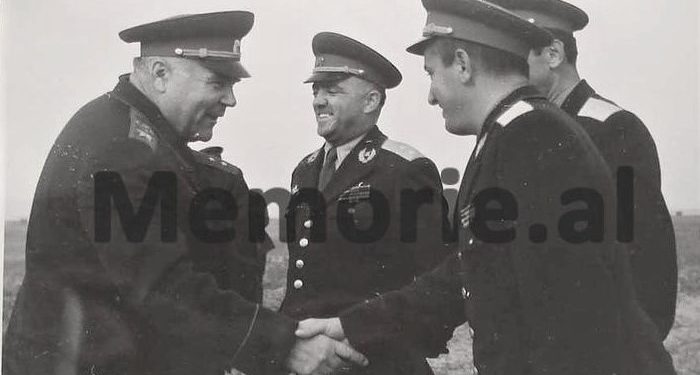
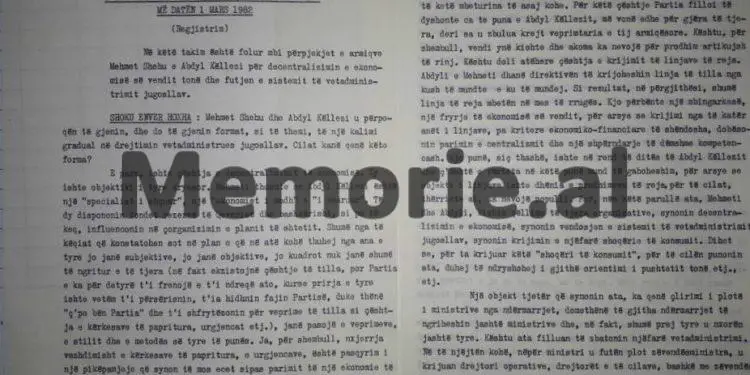
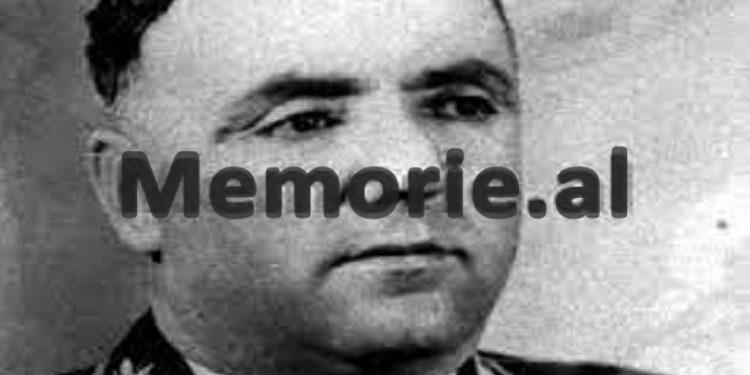
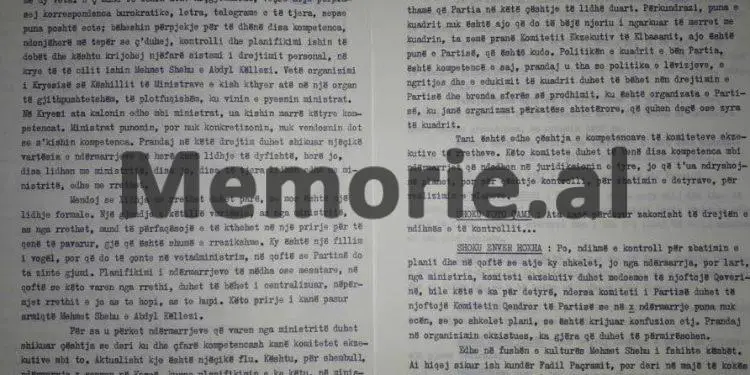
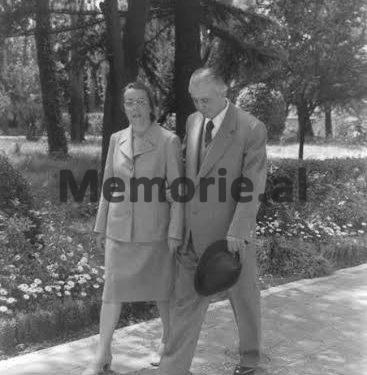
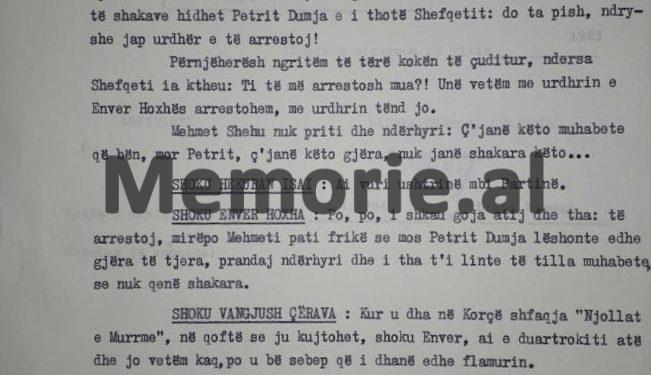
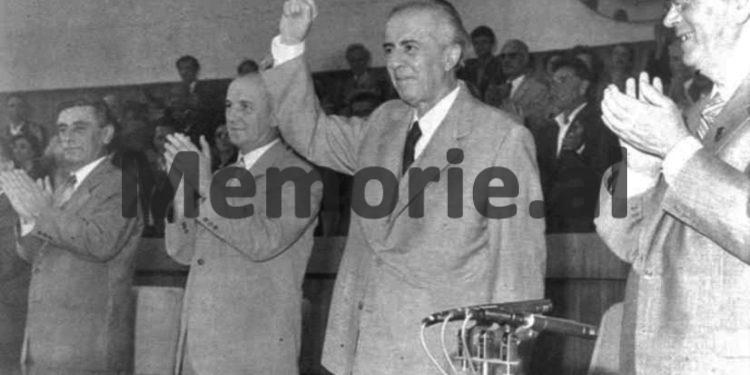
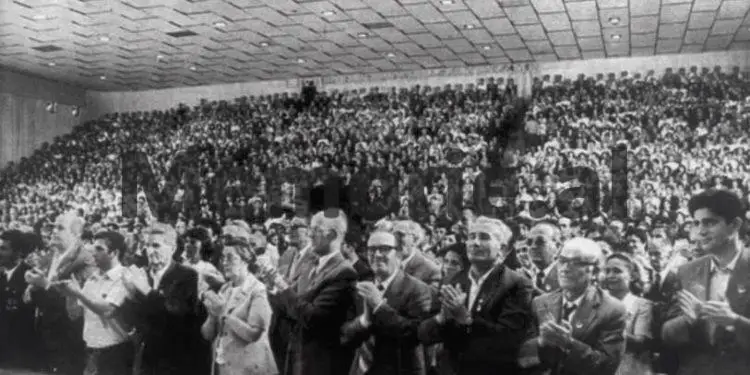
![“When the party secretary told me: ‘Why are you going to the city? Your comrades are harvesting wheat in the [voluntary] action, where the Party and Comrade Enver call them, while you wander about; they are fighting in Vietnam,’ I…”/ Reflections of the writer from Vlora.](https://memorie.al/wp-content/uploads/2025/06/admin-ajax-4-350x250.jpg)


![“The ensemble, led by saxophonist M. Murthi, violinist M. Tare, [with] S. Reka on accordion and piano, [and] saxophonist S. Selmani, were…”/ The unknown history of the “Dajti” orchestra during the communist regime.](https://memorie.al/wp-content/uploads/2026/02/admin-ajax-3-350x250.jpg)
![“In an attempt to rescue one another, 10 workers were poisoned, but besides the brigadier, [another] 6 also died…”/ The secret document of June 11, 1979, is revealed, regarding the deaths of 6 employees at the Metallurgy Plant.](https://memorie.al/wp-content/uploads/2026/02/maxresdefault-350x250.jpg)

